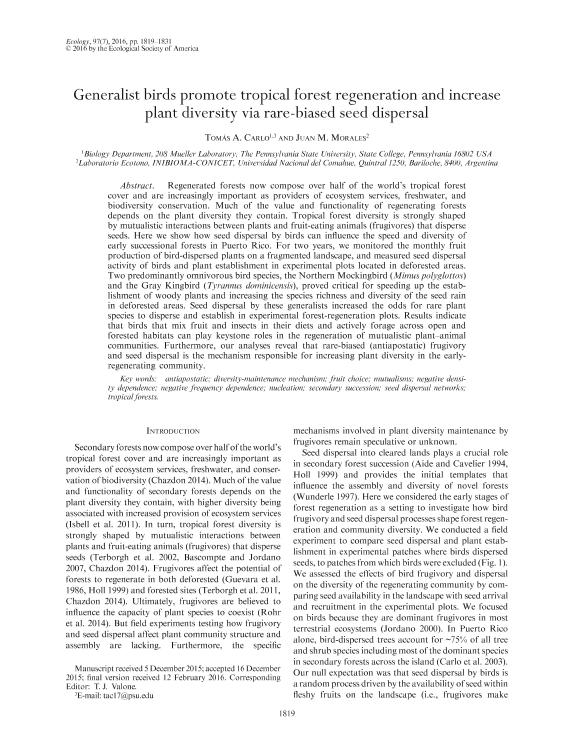Artículo
Generalist birds promote tropical forest regeneration and increase plant diversity via rare-biased seed dispersal
Fecha de publicación:
07/2016
Editorial:
Ecological Society of America
Revista:
Ecology
ISSN:
0012-9658
Idioma:
Inglés
Tipo de recurso:
Artículo publicado
Clasificación temática:
Resumen
Regenerated forests now compose over half of the world's tropical forest cover and are increasingly important as providers of ecosystem services, freshwater, and biodiversity conservation. Much of the value and functionality of regenerating forests depends on the plant diversity they contain. Tropical forest diversity is strongly shaped by mutualistic interactions between plants and fruit‐eating animals (frugivores) that disperse seeds. Here we show how seed dispersal by birds can influence the speed and diversity of early successional forests in Puerto Rico. For two years, we monitored the monthly fruit production of bird‐dispersed plants on a fragmented landscape, and measured seed dispersal activity of birds and plant establishment in experimental plots located in deforested areas. Two predominantly omnivorous bird species, the Northern Mockingbird (Mimus polyglottos) and the Gray Kingbird (Tyrannus dominicensis), proved critical for speeding up the establishment of woody plants and increasing the species richness and diversity of the seed rain in deforested areas. Seed dispersal by these generalists increased the odds for rare plant species to disperse and establish in experimental forest‐regeneration plots. Results indicate that birds that mix fruit and insects in their diets and actively forage across open and forested habitats can play keystone roles in the regeneration of mutualistic plant–animal communities. Furthermore, our analyses reveal that rare‐biased (antiapostatic) frugivory and seed dispersal is the mechanism responsible for increasing plant diversity in the early‐regenerating community.
Archivos asociados
Licencia
Identificadores
Colecciones
Articulos(INIBIOMA)
Articulos de INST. DE INVEST.EN BIODIVERSIDAD Y MEDIOAMBIENTE
Articulos de INST. DE INVEST.EN BIODIVERSIDAD Y MEDIOAMBIENTE
Citación
Carlo, Tomás A.; Morales, Juan Manuel; Generalist birds promote tropical forest regeneration and increase plant diversity via rare-biased seed dispersal; Ecological Society of America; Ecology; 97; 7; 7-2016; 1819-1831
Compartir
Altmétricas




